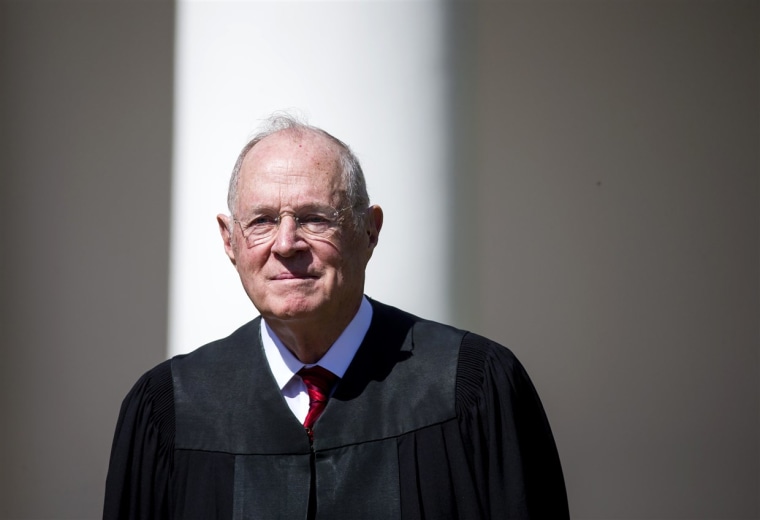Donald Trump headlined another campaign rally last night, this time in North Dakota, where the president briefly addressed the vacancy he'll soon try to fill on the U.S. Supreme Court. The New York Times reported:
Hours after Justice Anthony M. Kennedy presented an opportunity to push the Supreme Court to the right with his retirement, President Trump celebrated on Wednesday night the coming nomination of his second justice, an indisputable trophy as he tries to rally support for Republicans before the midterm elections."I'm very honored that he chose to do it during my term in office," Mr. Trump said of Justice Kennedy during a 70-minute freewheeling speech at a rally in this Republican stronghold, "because he felt confident for me to make the right choice and carry on his great legacy" -- one that has been far more moderate than Mr. Trump's.
To be sure, the president says a great many ridiculous things on a daily basis, but this boast was unnervingly sound. By stepping down from the Supreme Court when he did, Anthony Kennedy sent a clear, albeit mind-numbing, signal that he believes Donald J. Trump and his radicalized allies on Capitol Hill are deserving of a rare gift.
The retiring justice has watched Trump's presidency unfold, and he came to the conclusion that the Republican is a responsible and judicious leader who should shape the direction of American law for a generation.
And that in turn tells us something important about Anthony Kennedy's judgment -- and his legacy.
A few weeks ago, Trump published a tweet in which he declared that he has an "absolute right" to pardon himself. A half-hour later, Erick Erickson, a prominent Republican commentator, responded, referring to the president's missive, "Well folks, here's the tweet that just ensured Anthony Kennedy doesn't retire."
Erickson and I see the world through very different eyes, but at least on the surface, his observation made sense. Trump was flaunting the fact that he's an outrageous figure, with no sense of limits when it comes to his legal authority, who is considering steps that would create a genuine constitutional crisis. Kennedy, a responsible jurist who cares about the integrity of the American system, would see the president's tweets and, for the sake of the nation, feel compelled to stay at his post.
After all, empowering such a dangerous radical -- an unstable president of dubious legitimacy -- to shape the future of the institution he holds dear would be unthinkable.
Except it wasn't. Kennedy was aware of the political landscape, he recognized Trump's radicalism, he understood the importance of extending his career on the bench a bit longer, and he decided to leave anyway.
Kennedy took a good, long look at Trump, saw what the president is capable of, and effectively declared, "I want that guy to pick my successor."
Slate's Dahlia Lithwick added late yesterday, "Many of us predicted that Kennedy would not allow Trump to replace him with someone who would dismantle his legacy. We were wrong. Many of us believed that a lifelong devotee of dignity, civility, and the rule of law would not want his work tarnished by a president who routinely attacks individual judges and the very notion of an independent judiciary. We were wrong. That two of Anthony Kennedy’s last judicial acts included a letter that opened “My dear Mr. President” and a vote to grant that same president a virtual blank check on the national security front certainly suggests that nothing about a president who lies, bullies, and destabilizes the rule of law was any kind of real impediment to Kennedy’s departure.'
After more than four decades of public service on the federal bench, Kennedy's legacy may very well be defined by his resignation. It is a sad end to a historic career and an avoidable tragedy of his own making.
